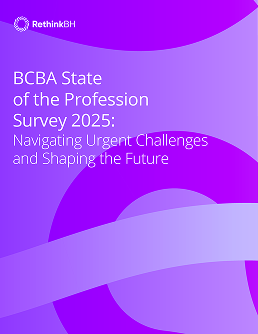
Insights on the stressors, systems, and solutions shaping the future of ABA therapy.
Demand for ABA therapy is rising – but clinicians are already stretched to their limits. This national survey of 390 practicing BCBAs reveals the systemic gaps undermining care while also highlighting opportunities to reduce burnout, streamline operations, and strengthen outcomes for both clinicians and clients.
Get insights from the field on the challenges BCBAs face, and the solutions that can help shape a more sustainable future.
BCBAs Under Pressure: The Path Forward
Key Finding 01
Stress Is Reaching Unsustainable Levels

89% of BCBAs report work-related stress, with more than 1 in 4 saying they are “very” or “unmanageably” stressed. In addition, 46% prioritize client well-being over their own health, putting them at risk for burnout and attrition.

Key Finding 02
Operational Overload is Pulling Clinicians Away from Care


61% say administrative demands interfere with client work, and 45% still rely on manual processes for critical tasks – inefficiencies that put both care outcomes and job satisfaction at risk.
Key Finding 03
Collaboration is Essential – But Often Missing

26% of BCBAs surveyed cite a lack of caregiver participation as the #1 obstacle to client progress, while nearly 20% point to poor provider collaboration, underscoring the need for stronger, more integrated care models.

Key Finding 04
Dosage Decisions Hinge on Experience More than Data

Only 9% reported using data-based technology to guide their dosage decisions. This underscores the field’s reliance on experience and adaptability, while also pointing to opportunities for greater standardization, enhanced training and stronger data support.

Download the BCBA State of the Profession Survey to see what’s driving stress and inefficiency in ABA today and discover solutions that help clinicians thrive while improving outcomes for families.
|